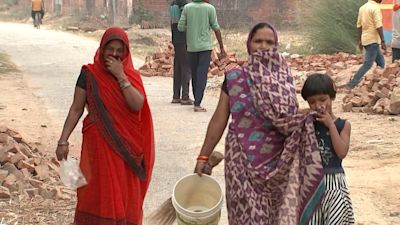Covid: The gruesome reality of India’s rural pandemic as the second wave races through villages

ITV News Correspondent Juliet Bremner reports on the impact of Covid in rural India as the country continues to see a surge in cases and deaths
A mystery illness is sweeping through the village of Sauram in India’s northern state of Uttar Pradesh.
It is around 500 miles away from the capital Delhi but in terms of health care facilities and understanding of this pandemic it might as well be on a different planet.
We learned that more than 20 people had died within the past three weeks, many of them in their 30s, 40s and 50s, all with fever and breathlessness.
It was obvious to us that these deaths must be as a result of Covid-19 and, to his credit, the village leader, Manoj Jaiswal, was also clear that the unexpected deaths must be as a result of the new variant of the virus.
However, there is virtually no coronavirus testing available in rural India and despite Mr Jaiswal’s call to district authorities for help, only 200 lateral flow tests had been sent to test a population of 15,000.
There are no gold standard PCRs and they have no idea when more lateral flows will arrive.
It means that three weeks after the deaths began, the majority of the households don’t know if they are infectious or not.
No doctor or health professional has been to the village and when we were shown the primary health clinic it looked derelict - gates padlocked and windows smashed.
It’s clear that it hasn’t been used for many months, possibly years.
Without this medical support, village elders do their best to protect the population. They spray homes and cattle sheds and encourage the wearing of masks.
They face widespread Covid denial both here and in other parts of rural India where 65% or around 900 million people live.
'No one believes that she had Covid': Mohammed Salman tells ITV News he does not believe his mum had Covid as no one in their family has had any symptoms
When we go to visit the family of Saira Begum - who died last week aged 52 - her relatives are adamant that she did not die of Covid.
According to her son, Mohammed Salman, it cannot be Covid because the other family members (more than 20 of them) living in the communal home do not have symptoms.
None of them have been tested so it is impossible to prove otherwise.
We hear the same story when we speak to the family of another victim, a widow tells me that her 42-year-old husband, who was fit and healthy until last week, has died from fever and low oxygen.
Again, she dismisses the idea that it might be Covid, instead suggesting it could be typhoid.
This is partly because of the stigma still attached to the virus in the more remote areas of India, but it is also fuelled by the lack of testing and medical assistance available in this vast state: Uttar Pradesh alone has a population of more than 200 million.
To put that in context it is roughly the same as the populations of UK, Germany and France combined.
Police officers in India tell ITV News they have witnessed around 50-70 funerals in two days
Inevitably this means that there is really no idea about how many people have actually lost their lives to this new variant.
Everyone agrees that it must be far greater than official records show and we witnessed graphic evidence of this on the banks of the Ganges just a few miles from Sauram.
When we arrived there were two cremations in progress and a third body was being carried down to the river front.
Police officers have joined the mourners, sent here to monitor how many funerals are being held and crucially to note the cause of death.
The young officer carefully detailing this information in longhand in his ledger told me they had seen between 50 and 70 funerals since he was posted here two days ago and added "most are Covid".
ITV News Correspondent Juliet Bremner reports on the reality of India's rural pandemic as the second wave rips through communities
An hour down the stream and this holy river disgorged horrific evidence of the true numbers dying. Last week dozens of bodies were washed up at Chanda - where there’s a sharp bend in the Ganges.
It’s almost certain that these came from cremation sites that were overwhelmed or poor families that couldn’t afford wood for the pyres.
As a result police patrols now operate on boats up and down this stretch of the Ganges, attempting to stop the disposal of bodies and persuade local people not the put them in the water.
Yet it still continues as more than a dozen bodies were pulled from the river over the weekend.
This is the gruesome reality of India’s rural pandemic as the second wave, combined with a new more infectious variant, races through the villages and smaller towns that make up so much of the population.
Coronavirus: What You Need To Know - listen to the podcast